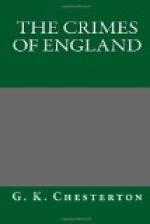saddled two separate and sensible nations with the
horrible mixed metaphor called the Union. Here
there is no possible see-saw of sympathies as there
can be between Brutus and Caesar or between Cromwell
and Charles I.: there is simply nobody who supposes
that Emmet was out for worldly gain, or that Castlereagh
was out for anything else. Even the incidental
resemblances between the two sides only served to sharpen
the contrast and the complete superiority of the nationalists.
Thus, Castlereagh and Lord Edward Fitzgerald were
both aristocrats. But Castlereagh was the corrupt
gentleman at the Court, Fitzgerald the generous gentleman
upon the land; some portion of whose blood, along
with some portion of his spirit, descended to that
great gentleman, who—in the midst of the
emetic immoralism of our modern politics—gave
back that land to the Irish peasantry. Thus again,
all such eighteenth-century aristocrats (like aristocrats
almost anywhere) stood apart from the popular mysticism
and the shrines of the poor; they were theoretically
Protestants, but practically pagans. But Tone
was the type of pagan who refuses to persecute, like
Gallio: Pitt was the type of pagan who consents
to persecute; and his place is with Pilate. He
was an intolerant indifferentist; ready to enfranchise
the Papists, but more ready to massacre them.
Thus, once more, the two pagans, Tone and Castlereagh,
found a pagan end in suicide. But the circumstances
were such that any man, of any party, felt that Tone
had died like Cato and Castlereagh had died like Judas.
The march of Pitt’s policy went on; and the
chasm between light and darkness deepened. Order
was restored; and wherever order spread, there spread
an anarchy more awful than the sun has ever looked
on. Torture came out of the crypts of the Inquisition
and walked in the sunlight of the streets and fields.
A village vicar was slain with inconceivable stripes,
and his corpse set on fire with frightful jests about
a roasted priest. Rape became a mode of government.
The violation of virgins became a standing order of
police. Stamped still with the same terrible
symbolism, the work of the English Government and the
English settlers seemed to resolve itself into animal
atrocities against the wives and daughters of a race
distinguished for a rare and detached purity, and of
a religion which makes of innocence the Mother of God.
In its bodily aspects it became like a war of devils
upon angels; as if England could produce nothing but
torturers, and Ireland nothing but martyrs. Such
was a part of the price paid by the Irish body and
the English soul, for the privilege of patching up
a Prussian after the sabre-stroke of Jena.




